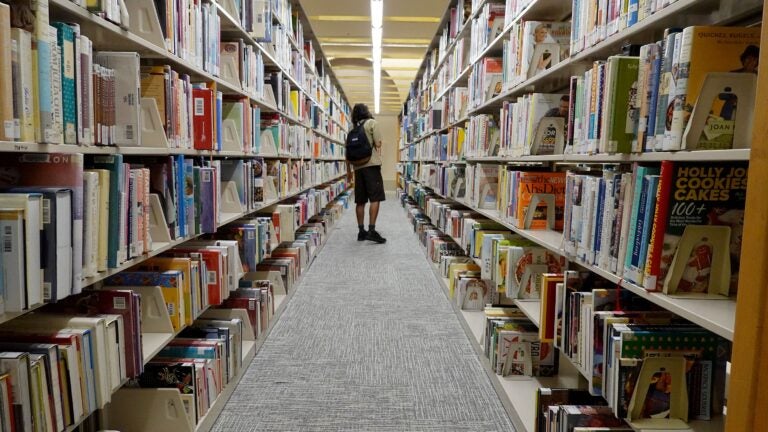Book bans are rising sharply in public libraries
Books
Two years into a surge in book banning efforts across the country, restrictions that were largely happening in school libraries, where they affected children, are now affecting the wider community as well.

More than two years into a sharp rise in book challenges across the United States, restrictions are increasingly targeting public libraries, where they could affect not only the children’s section but also the books available to everyone in a community.
The shift comes amid a dramatic increase in efforts to remove books from libraries, according to a pair of new reports released this week from the American Library Association and PEN America, a free speech organization.
The ALA found that nearly half the book challenges it tracked between January and August of this year took place in public libraries, up from 16% during the same period the year before. The association reported nearly 700 attempts to censor library materials, which targeted more than 1,900 individual titles — more than during the same period in 2022, a year that saw the most titles challenged since the organization began tracking the data.
Most of the challenged books were by or about people of color or LGBTQ people.
“A year, a year and a half ago, we were told that these books didn’t belong in school libraries, and if people wanted to read them, they could go to a public library,” said Deborah Caldwell-Stone, director of the ALA’s Office for Intellectual Freedom. “Now, we’re seeing those same groups come to public libraries and come after the same books, essentially depriving everyone of the ability to make the choice to read them.”
The new figures underscore a stark new reality for librarians and libraries, which have increasingly found themselves at the center of a vicious new front in the culture wars.
Some libraries have received bomb threats; others are at risk of having their funding slashed or even face closure over disputes about book removals. In some instances, librarians have been harassed, threatened, and called groomers and pedophiles.
The ALA has come under attack for its policies regulating library collections. In recent months, libraries in a handful of states, including Texas, Montana and Missouri, have cut ties with the ALA.
The movement to restrict access to books is likely broader than the numbers indicate. PEN’s numbers are compiled from public reports, school district data and local organizations that track book bans, but many removals are likely going unreported.
The PEN report, which counted book removals in school and classroom libraries during the 2022-2023 school year, found 3,362 cases of books being removed, a 33% increase over the previous school year. More than 1,550 individual titles were targeted. Many of the same books are challenged around the country, including classics by Toni Morrison and Margaret Atwood, and contemporary young adult fiction by popular authors like John Green.
The most dramatic spike in book bans took place in Florida, which removed more than 1,400 books and surpassed Texas as the state with the highest number of removals, according to PEN. Florida emerged as a hot spot for book challenges after the state passed several laws aimed in part at restricting educational and reading material on certain subjects. As school districts scrambled to comply with the new regulations earlier this year, some teachers and librarians removed entire shelves of books.
While book banning isn’t a new issue, it has become an increasingly volatile and polarizing one. Book removals have been increasing around the United States for more than two years, beginning with the rise of “parents’ rights” groups that formed during the pandemic to challenge COVID restrictions and then, what material students were exposed to in schools.
That movement has accelerated as such groups, including Moms for Liberty and Utah Parents United, have circulated lists of books that they deem objectionable and lobbied for new legislation and new library policies that make it easier to challenge books.
Brooke Stephens, education director at Utah Parents United, runs a website that rates what it describes as sexually explicit books. She said that calling these books “banned” is wrong; they are available in bookstores, for example, and online. Her work, she said, focuses on keeping them out of school libraries where children can stumble upon them and encounter subject matter for which they’re unprepared.
Books should have a rating system, she said, the way movies and video games do.
“There’s something about the privacy of the written word that makes people think it’s different than a movie in a classroom,” Stephens said. “But I don’t believe they’d read these books out loud in a classroom because they’re inappropriate.”
While restrictions on books are rising, efforts to combat them are as well. Lawsuits challenging new state laws have been filed in states including Arkansas and Florida, and a judge in Texas recently issued a preliminary injunction against a law that would require bookstores to evaluate and rate every title they sell to schools and every book they’ve sold to schools in the past.
Free speech advocates say that they see no sign that efforts to ban books are slowing down and warn that the next phase of the movement may be harder to quantify and counteract, as some school districts suspend new book purchases or avoid stocking books on topics that might be viewed as controversial.
“The way it’s going to begin to manifest may look different,” said Kasey Meehan, lead author of PEN’s report. “We’ll begin to see this chilled atmosphere play out in different ways, either through quietly removing books or not bringing books in in the first place.”
This article originally appeared in The New York Times.
📚 Stay up-to-date on the Book Club
Catch up on the latest Boston.com Book Club pick and join the virtual author discussions.